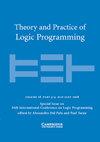多智能体信念PAC语义的可学习性
IF 1.1
2区 数学
Q3 COMPUTER SCIENCE, SOFTWARE ENGINEERING
引用次数: 0
摘要
演绎与归纳法之间的紧张关系可能是哲学、认知和人工智能等领域最根本的问题。在一篇有影响力的论文中,Valiant认识到学习的挑战应该与推理相结合。特别是,他提出了一种语义,用于捕获在逻辑中表述时可能近似正确(PAC)学习算法的输出所具有的质量。虽然比经典蕴涵弱,但它允许一个强大的模型理论框架来回答查询。本文为用多智能体认知逻辑来演示PAC学习提供了一个新的技术基础。为了规避文献中关于使用PAC语义进行稳健学习困难的负面结果,我们考虑了所谓的内隐学习,在这种学习中,我们能够将观察结果纳入背景理论,以决定认知查询的蕴涵。我们证明了学习过程的正确性,并讨论了样本复杂性的结果,即在给定用户指定的错误界限的情况下,我们需要多少个观察值来证明查询是必需的。最后,我们研究了在什么情况下该算法是有效的。最后一点,考虑到认知逻辑中的推理,特别是多智能体认知逻辑中的推理是pspace完全的,这个问题似乎没有希望。我们利用所谓的表征定理的一些最新成果,探索了单智能体和多智能体的认知逻辑,并使用唯一知道算子将模态推理简化为命题推理。本文章由计算机程序翻译,如有差异,请以英文原文为准。
Learnability with PAC Semantics for Multi-agent Beliefs
Abstract The tension between deduction and induction is perhaps the most fundamental issue in areas such as philosophy, cognition, and artificial intelligence. In an influential paper, Valiant recognized that the challenge of learning should be integrated with deduction. In particular, he proposed a semantics to capture the quality possessed by the output of probably approximately correct (PAC) learning algorithms when formulated in a logic. Although weaker than classical entailment, it allows for a powerful model-theoretic framework for answering queries. In this paper, we provide a new technical foundation to demonstrate PAC learning with multi-agent epistemic logics. To circumvent the negative results in the literature on the difficulty of robust learning with the PAC semantics, we consider so-called implicit learning where we are able to incorporate observations to the background theory in service of deciding the entailment of an epistemic query. We prove correctness of the learning procedure and discuss results on the sample complexity, that is how many observations we will need to provably assert that the query is entailed given a user-specified error bound. Finally, we investigate under what circumstances this algorithm can be made efficient. On the last point, given that reasoning in epistemic logics especially in multi-agent epistemic logics is PSPACE-complete, it might seem like there is no hope for this problem. We leverage some recent results on the so-called Representation Theorem explored for single-agent and multi-agent epistemic logics with the only knowing operator to reduce modal reasoning to propositional reasoning.
求助全文
通过发布文献求助,成功后即可免费获取论文全文。
去求助
来源期刊

Theory and Practice of Logic Programming
工程技术-计算机:理论方法
CiteScore
4.50
自引率
21.40%
发文量
40
审稿时长
>12 weeks
期刊介绍:
Theory and Practice of Logic Programming emphasises both the theory and practice of logic programming. Logic programming applies to all areas of artificial intelligence and computer science and is fundamental to them. Among the topics covered are AI applications that use logic programming, logic programming methodologies, specification, analysis and verification of systems, inductive logic programming, multi-relational data mining, natural language processing, knowledge representation, non-monotonic reasoning, semantic web reasoning, databases, implementations and architectures and constraint logic programming.
 求助内容:
求助内容: 应助结果提醒方式:
应助结果提醒方式:


